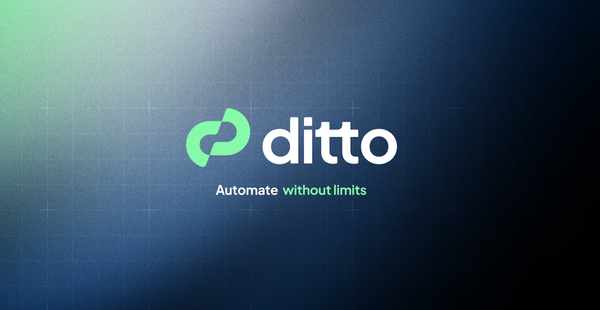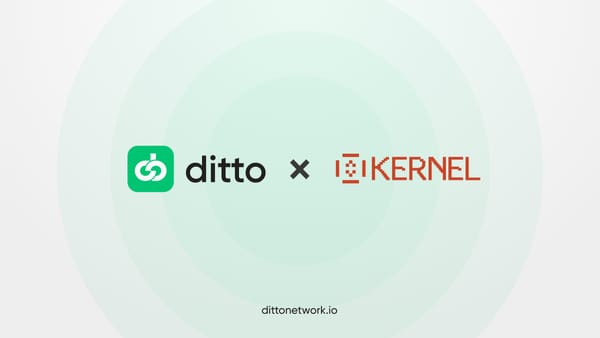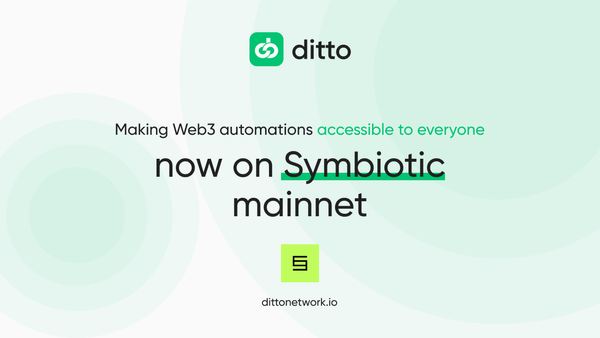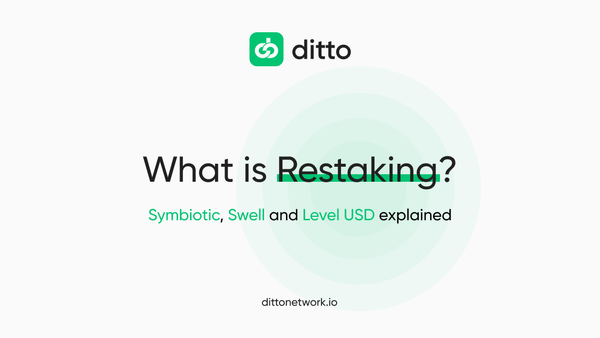Optimizing Ethereum Validators with Automation and Efficiency | Ditto Network
In the decentralized world of blockchains, Ethereum validators are the backbone, ensuring the security and validation of transactions. Validators (or AVS operators) play a critical role in maintaining the smooth operation of blockchain networks.
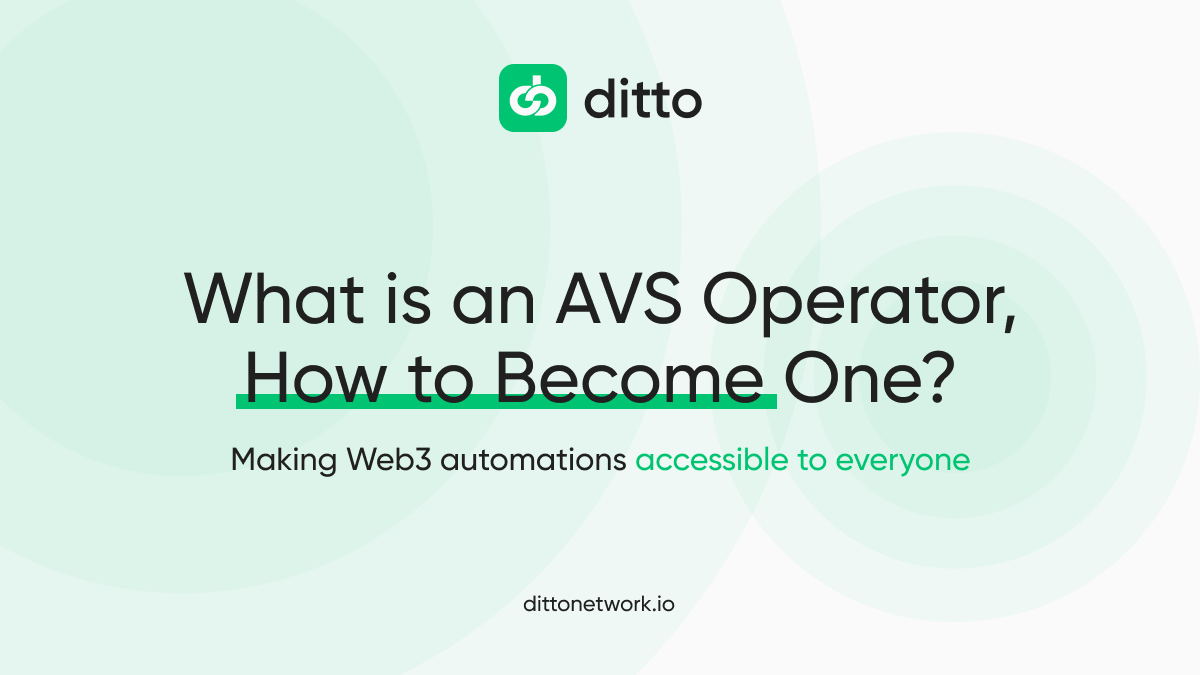
The Role of Ethereum Validators
In the decentralized world of blockchains, Ethereum validators are the backbone, ensuring the security and validation of transactions. Validators—whether individuals or organizations—play a critical role in maintaining the smooth operation of blockchain networks. As Web3 technologies continue to grow in complexity, building scalable decentralized applications becomes increasingly important. This rising complexity also increases the demand for validators and operators.
Ethereum validators are pivotal in securing and validating smart contracts and transactions on the Ethereum network. However, while Ethereum’s framework is decentralized, it also places substantial technical and capital demands on its validators. As the network continues to scale, challenges like capital efficiency and accessibility have limited broader participation, prompting the need for innovations like EigenLayer integration and Symbiotic.
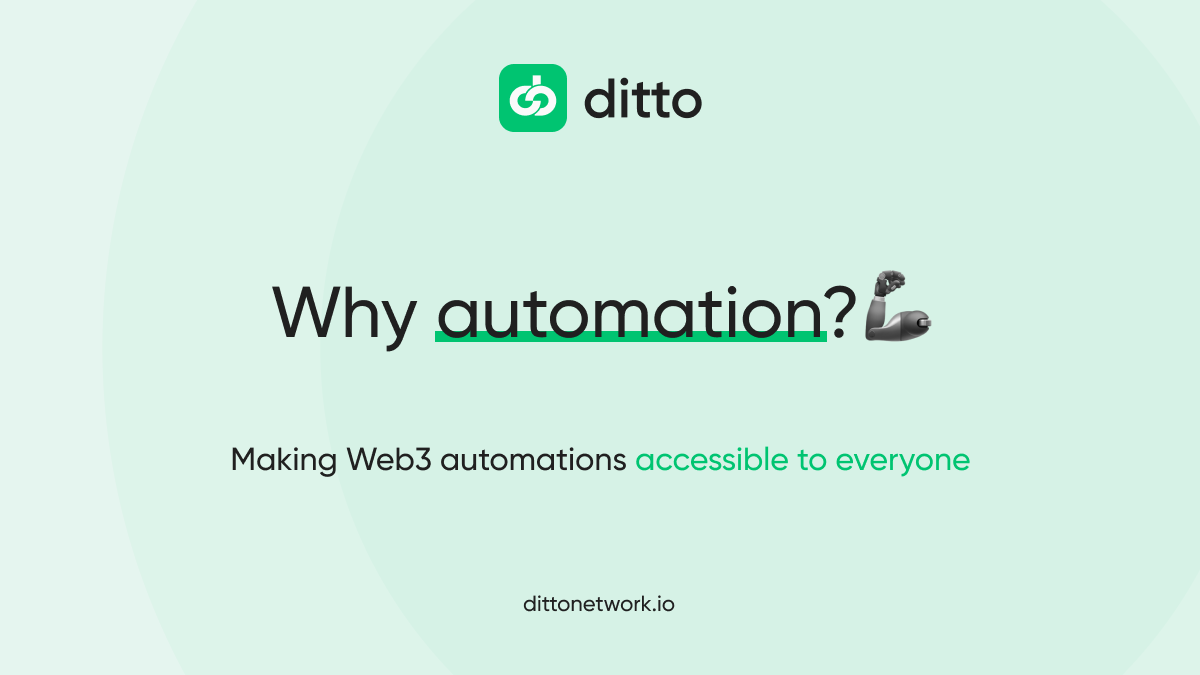
Why EigenLayer and Symbiotic?
To address these challenges, shared security protocols like EigenLayer and Symbiotic were introduced. These models enable validators to restake their Ethereum assets, allowing them to provide security for multiple networks or decentralized applications (dApps) without the need for additional capital. Restaking on EigenLayer lets validators reuse their existing staked ETH, thereby enhancing capital efficiency and enabling validators to perform multiple roles using the same staked assets.
EigenLayer essentially makes smart contract automation and validation more scalable by offering a shared security model. Meanwhile, Symbiotic offers a more resource-sharing approach, reducing the technical barriers to entry. Both of these protocols are critical for supporting the next generation of DeFi and dApps growth on Ethereum.
Key Functions of Ethereum Validators
Ethereum validators play a crucial role in maintaining the security and efficiency of the network by performing several essential functions:
- Block Proposal: Validators are randomly selected to propose new blocks to the blockchain. This process helps in maintaining the network's decentralized nature and ensures that no single entity controls the addition of blocks.
- Block Attestation: Validators are responsible for verifying the validity of proposed blocks. They attest to blocks they believe should be added to the blockchain, providing critical consensus on which blocks are valid.
- Committee Participation: Validators are shuffled into committees periodically to vote on proposed blocks. This rotation ensures both decentralization and security, preventing any single validator or group of validators from gaining undue influence over the network.
These roles are essential for the successful execution of proof-of-stake (PoS) consensus, ensuring that the Ethereum blockchain remains secure and resilient. But, this system requires some extra innovative help from the ecosystem for optimization for scalability, like EigenLayer integration. Validators, by leveraging restaking opportunities on platforms like EigenLayer, can further enhance their roles, contributing to the security of multiple decentralized applications (dApps) while increasing capital efficiency. Eigenlayer also let’s all the builders to develop their own decentralized app easily.
“Anyone building a new decentralized service for Ethereum must bootstrap a new trust network to secure their system, fragmenting security. EigenLayer solves this problem by enabling any service, regardless of its composition (e.g. EVM-compatibility), to tap into the pooled security of Ethereum’s stakers, creating an environment for permissionless innovation and free-market governance.” -EigenLayer
Ditto’s Contribution: AVS and Automation for Developers
Ditto builds on the innovations of EigenLayer and Symbiotic by adding an automation layer with Actively Validated Services (AVS). AVS operators are not only responsible for validating services but can also automate on-chain workflows, reducing manual intervention and ensuring economic guarantees of execution. This automation layer is key as decentralized applications continue to grow in complexity.
For example, Ditto’s AVS enables:
- Automation for developers: With Ditto, developers can automate their dApp’s processes, ensuring that validation and execution happen seamlessly without downtime or failure.
- Increased security: Leveraging the shared security model, operators can run multiple services across networks without additional overhead, ensuring robust protection against failures.
- Streamlined operations: Operators no longer need to manually monitor workflows. Instead, they can rely on Ditto’s automation, making the entire process more efficient and scalable.
Why Become an AVS Operator?
Becoming an AVS operator offers significant benefits, whether you're a seasoned developer or a validator looking to optimize your participation in multiple networks:
- Open Participation: AVS allows anyone with the right resources to become an operator. There’s no whitelisting or gatekeeping, which promotes decentralized participation in the Web3 ecosystem.
- Earn Rewards: Operators are compensated for validating and executing tasks. By contributing to the network, they earn rewards that are proportionate to their involvement, making the process financially sustainable.
- Capital Efficiency: By leveraging EigenLayer’s shared security, operators can use their staked assets for multiple roles across different networks. This significantly reduces the need for additional capital, maximizing efficiency.
- Automation for Developers: Ditto’s smart contract automation tools allow developers to streamline processes, saving time and reducing the risk of errors, while ensuring the reliability of on-chain workflows.
How to Become a Ditto AVS Operator
Although currently, Ditto is accepting only whitelisted operators during its testnet phase, the platform will soon be open to all. Here’s how to get started as an AVS operator:
- Set Up Your Infrastructure: Download the operator node binary and configure your environment, ensuring secure operation with private key management.
- Register as an Operator: After setting up your node, you’ll need to send a transaction to register and join the pool for task assignments.
- Participate in Task Assignments: As an operator, you’ll be periodically assigned tasks. Depending on your role (executor, attester, or aggregator), you’ll contribute to the system’s validation and automation workflows.
- Leverage Shared Security: Through EigenLayer integration, your staked ETH or liquid staking tokens (LST) can be restaked across multiple networks, increasing your efficiency and earning potential.
By following these steps, you can actively contribute to the security and automation of Web3, enabling faster and more efficient dApp deployment.
Why Choose Ditto for Web3 Automation?
Ditto Network introduces a trustless and automated solution for Web3 applications, built on shared security. Its infrastructure is designed to power scalable dApps and streamline complex workflows through automation. With EigenLayer and Symbiotic backing the security and Ethereum validators ensuring transaction execution, Ditto delivers reliable, secure, and economically efficient automation solutions.
Conclusion
The future of Web3 is decentralized, and with innovations like EigenLayer integration and smart contract automation, validators and developers have more tools at their disposal than ever before. Whether you're looking to participate in Ethereum’s validator ecosystem or leverage Ditto’s automated infrastructure, the opportunities for scaling and securing your decentralized applications are vast.
By becoming an AVS operator on Ditto, you’re not only contributing to the security of Ethereum but also tapping into a system that maximizes capital efficiency and provides real-time automation for DeFi and dApps growth.
About Ditto Network
Ditto Network is a trustless actively validated keeper network (AVS) that runs event-driven workflows with economic guarantees of execution, leveraging shared security. In addition, Ditto offers various intent-centric automation modules and SDKs for founders and developers, introducing the future of embedded finance solutions in Web3.
The team is comprised of experienced web3 developers and professionals with backgrounds and previous exits in web3 from McKinsey, Uniswap, Nil Foundation, TrustWallet, NEAR, 3Commas, and PE/VC.
Website | X | Discord | Book a Call to Integrate Ditto to Your Project


